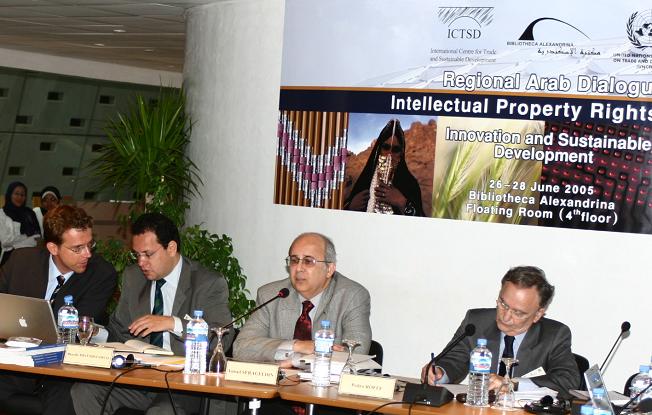Over recent
years, there has been an unprecedented increase in the scope and
level of protection of intellectual property rights (IPRs) including
patents, copyrights, trademarks, and geographical indications.
This trend has generated new opportunities, but also new tensions
around key public policy concerns such as public health, food
security, education, innovation, transfer of technology and biodiversity
management. While much of the debate still focuses on the WTO
TRIPs Agreement, higher standards of protection, with narrowed
down exceptions (TRIPs – plus) are increasingly being included
in new bilateral and regional free trade agreements. In a knowledge-based
economy, a strong understanding of IPRs and their development
implications is indispensable to informed policy making in all
areas of human development.

Christoph Spennemann, UNCTAD; Ricardo Melendez-Ortiz,
ICTSD; Ismail Seragelden, Director, Library of Alexandria; Pedro
Roffe, ICTSD.
As a
contribution to this debate, the Arab Regional Dialogue aimed
to:
1. Provide a platform for strategic discussions among relevant
stakeholders on trends and thematic issues in the area of intellectual
property (IP) and their implications for sustainable development;
2. Analyse current trends in IP standard-setting in the Arab region;
3. Explore linkages between sustainable development policies and
intellectual property in areas such as health; nutrition; access
to information and knowledge goods; and the protection of cultural
goods, folklore and traditional knowledge;
4. Develop elements of a "regional agenda" for development-oriented
IP policies and informal mechanisms for its advancement, through
mainly joint research and networking.
The Dialogue
focused on four topics:
1. General trends and the emerging international IP architecture
2. Health - 2005 and Beyond
3. Access to Knowledge and Educational Material
4. The protection of expressions of folklore, cultural heritage
and traditional knowledge in the Arab region
A total
of 25-30 participants were invited to the Regional Dialogue.
Participants included a variety of stakeholders including negotiators,
government experts, international governmental organizations,
academia and civil society organizations. Emphasis was placed
on actors at the regional and national level so as to widen
participation and promote reforms and changes at those levels.